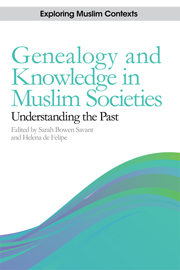Book contents
- Frontmatter
- Contents
- List of Figures and Tables
- Introduction
- Part One The Generation of Genealogical Knowledge
- Part Two Empowering Political and Religious Elites
- 4 Berber Leadership and Genealogical Legitimacy: The Almoravid Case
- 5 Ways of Connecting with the Past: Genealogies in Nasrid Granada
- 6 Embarrassing Cousins: Genealogical Conundrums in the Central Sahara
- Part Three Genealogy as a Source for Writing History
- About the Contributors
- Index
6 - Embarrassing Cousins: Genealogical Conundrums in the Central Sahara
from Part Two - Empowering Political and Religious Elites
Published online by Cambridge University Press: 05 September 2014
- Frontmatter
- Contents
- List of Figures and Tables
- Introduction
- Part One The Generation of Genealogical Knowledge
- Part Two Empowering Political and Religious Elites
- 4 Berber Leadership and Genealogical Legitimacy: The Almoravid Case
- 5 Ways of Connecting with the Past: Genealogies in Nasrid Granada
- 6 Embarrassing Cousins: Genealogical Conundrums in the Central Sahara
- Part Three Genealogy as a Source for Writing History
- About the Contributors
- Index
Summary
Anybody looking for history (ta'rīkh) in the Central Sahara will soon be supplied with large quantities of tawārīkh: more or less historic documents looking suspiciously like genealogies. Sometimes, these tawārīkh are written documents, carefully preserved by their owners; in most cases, however, reference is made to documents that are strikingly elusive, supposedly kept in private or in public archives elsewhere, and that matter mainly because of their existence, or rather, because this existence can be publicly claimed as beyond doubt. These tawārīkh are important, even today, because they are much more than accounts of past events. Through their form, as written Arabic documents, and their content, which inevitably refers to names and figures known from Islamic history, they bear witness to the participation of individual families in universal history.
The Central Sahara has long been an area marked by an inherent dependency on outside connections, an economic and political dependency that is reflected in local notions of identity and social order. People are who they are because of their ability to publicly attach themselves to larger historical geographies of belonging that are coextensive with the putative universal scheme of Islamic history: Genealogies are but one way of establishing such connections beyond doubt, while written tawārīkh, where recognised as valid, act as a physical proof of the legitimacy of such claims. Drawing on unexplored local archives and long-term fieldwork in southern Algeria and northern Mali, this chapter will first describe the universalising aspirations of local genealogical writings and how they express and renegotiate local hierarchies.
- Type
- Chapter
- Information
- Genealogy and Knowledge in Muslim SocietiesUnderstanding the Past, pp. 89 - 102Publisher: Edinburgh University PressPrint publication year: 2014



